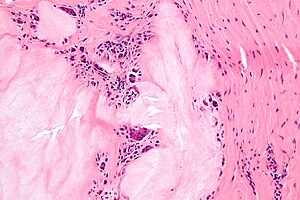Difference between revisions of "Gout"
Jump to navigation
Jump to search
| Line 34: | Line 34: | ||
==General== | ==General== | ||
*Classically afflicts the big toe - known as '''podagra'''. | *Classically afflicts the big toe - known as '''podagra'''. | ||
Epidemiology:<ref name=pmid22544037>{{Cite journal | last1 = Wang | first1 = Y. | last2 = Yan | first2 = S. | last3 = Li | first3 = C. | last4 = Zhao | first4 = S. | last5 = Lv | first5 = J. | last6 = Wang | first6 = F. | last7 = Meng | first7 = D. | last8 = Han | first8 = L. | last9 = Wang | first9 = Y. | title = Risk factors for gout developed from hyperuricemia in China: a five-year prospective cohort study. | journal = Rheumatol Int | volume = 33 | issue = 3 | pages = 705-10 | month = Mar | year = 2013 | doi = 10.1007/s00296-012-2439-8 | PMID = 22544037 }}</ref> | |||
*Male (Females RR ~ 0.1). | |||
*Renal failure. | |||
*Diabetes mellitus. | |||
Etiology:<ref name=Ref_PCPBoD8>{{Ref PCPBoD8|634}}</ref> | Etiology:<ref name=Ref_PCPBoD8>{{Ref PCPBoD8|634}}</ref> | ||
Revision as of 19:21, 29 December 2016
| Gout | |
|---|---|
| Diagnosis in short | |
 Gouty tophus. H&E stain. | |
| Site | joints - classically large toe |
|
| |
| Symptoms | joint pain |
| Prevalence | common |
| Prognosis | benign |
Gout is a common benign affliction that can be disabling. It occasionally is seen by pathologists and can be grouped with conditions with crystals in body fluids.
General
- Classically afflicts the big toe - known as podagra.
Epidemiology:[1]
- Male (Females RR ~ 0.1).
- Renal failure.
- Diabetes mellitus.
Etiology:[2]
- Overproduction of uric acid ~ 10% of cases.
- Reduced excretion of uric acid ~ 90% of cases.
Gross/radiology
- Radiologically may mimic anconeus epitrochlearis muscle.[5]
DDx:
- Epidermal inclusion cyst. (???)
Microscopic
Features:[6]
- Tophi (advanced)
- Reactive granulomatous inflammation.
- Surrounds fluffy (cotton candy-like) material.
- Fibrotic synovium.
- Aggregates of urate crystals. (???)
- Reactive granulomatous inflammation.
Note:
- The classically described polarization of light (see crystals in body fluids) is typically not present in formalin fixed tissue.[7]
Images
www:
- Gouty tophus - A. xray, B. Diff-Quick, C. Pap smear, D. polarized light, E. H&E (archivesofpathology.org).
- Gout - several images (upmc.edu).
See also
References
- ↑ Wang, Y.; Yan, S.; Li, C.; Zhao, S.; Lv, J.; Wang, F.; Meng, D.; Han, L. et al. (Mar 2013). "Risk factors for gout developed from hyperuricemia in China: a five-year prospective cohort study.". Rheumatol Int 33 (3): 705-10. doi:10.1007/s00296-012-2439-8. PMID 22544037.
- ↑ Mitchell, Richard; Kumar, Vinay; Fausto, Nelson; Abbas, Abul K.; Aster, Jon (2011). Pocket Companion to Robbins & Cotran Pathologic Basis of Disease (8th ed.). Elsevier Saunders. pp. 634. ISBN 978-1416054542.
- ↑ Online 'Mendelian Inheritance in Man' (OMIM) 607096
- ↑ Tin, A.; Woodward, OM.; Kao, WH.; Liu, CT.; Lu, X.; Nalls, MA.; Shriner, D.; Semmo, M. et al. (Oct 2011). "Genome-wide association study for serum urate concentrations and gout among African Americans identifies genomic risk loci and a novel URAT1 loss-of-function allele.". Hum Mol Genet 20 (20): 4056-68. doi:10.1093/hmg/ddr307. PMID 21768215.
- ↑ URL: http://radiology.casereports.net/index.php/rcr/article/viewArticle/57/213. Accessed on: 7 August 2011.
- ↑ URL: http://pathologyoutlines.com/joints.html#gout. Accessed on: 5 August 2011.
- ↑ Shidham, V.; Chivukula, M.; Basir, Z.; Shidham, G. (Aug 2001). "Evaluation of crystals in formalin-fixed, paraffin-embedded tissue sections for the differential diagnosis of pseudogout, gout, and tumoral calcinosis.". Mod Pathol 14 (8): 806-10. doi:10.1038/modpathol.3880394. PMID 11504841.

